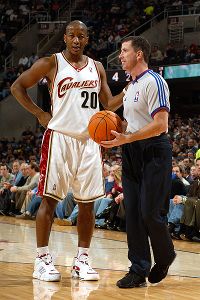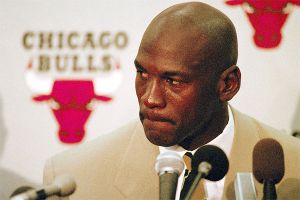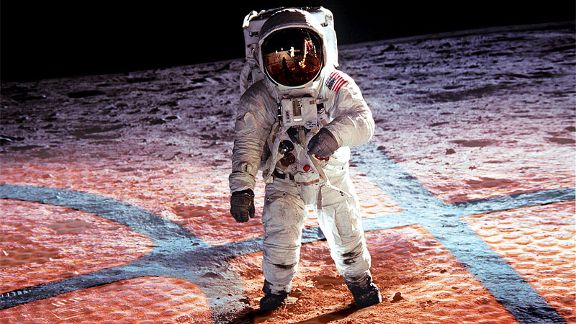| (ZT) NBA Conspiracy Theories |
| 送交者: Mayi 2014年05月22日10:47:53 於 [競技沙龍] 發送悄悄話 |
No such thing as a bad theoryWhat's behind our never-ending fascination with NBA conspiracies?
This story appears in ESPN The Magazine's March 17 Conspiracy Issue. Subscribe today! THE AGENT TO both Patrick Ewing and Michael Jordan isn't saying he believes it. David Falk isn't telling me that on the day of the first-ever NBA draft lottery, in 1985, then-commissioner David Stern really froze the No. 1 envelope -- rigging the drawing to deliver Ewing to a sputtering league's biggest market. "I don't adhere to it," Falk tells me. "I'm not saying it happened." Then comes a pause that seems to drag on forever. "But," he offers, "that theory is plausible." For 92 minutes on a Sunday afternoon, I've listened to the formerly most powerful representative in the game explain the difference between truth and plausibility, between reality and perception. And like many around the league, it turns out, Falk does not think every alleged conspiracy is created equal. He laughs off the notion that Stern strong-armed Jordan into a gambling-addiction-induced retirement in '93. "That's a silly one," Falk says. "Michael called me at home, on a Saturday, and said, 'I'm going to retire.' Did Michael's leaving help the NBA? No!" But with Ewing to New York, Falk allows, there was a motive ("Good business reasons"). There was a mechanism ("Whether David Stern used dry ice or infrared glasses or gamma rays, I was thrilled"). The theory was plausible enough, anyway, to find purchase inside bars and concourses, infecting discourse, triggering a contagion of conspiracy charges over the three decades since. Such a singular roll call -- which includes but is not limited to: the Frozen Envelope; Jordan's Pseudo-Retirement; the Lakers' 27 Free Throws in the Fourth Quarter of Game 6 Against the Kings; the Existence of Tim Donaghy; Dwyane Wade's Shooting as Many Free Throws as Dallas in Game 5 of the '06 Finals; "Basketball Reasons" (the Vetoed Chris Paul Trade); Cleveland's Getting the '03 No. 1 Pick Because a Hometown Kid Was the No. 1 Prospect; Chicago's Getting the '08 No. 1 Pick Because a Hometown Kid Was the No. 1 Prospect; Washington's Getting the 2010 No. 1 Pick With the Widow of the Team's Recently Deceased Owner Watching; Cleveland's Getting the 2011 No. 1 Pick With the Owner's 14-Year-Old Son (Who Suffers From Neurofibromatosis) Watching; and New Orleans' Getting the 2012 No. 1 Pick Because the League Owned It -- was why I was calling folks like Falk in the first place. My assignment? Uncover why the Association inspires more conspiracy theories, in volume and salience, than any other U.S. sport. Ask sources around the league to rationalize the irrationality behind the 125,000 YouTube videos that appear when you search "NBA + rigged" -- nearly three times as many as the NFL (27,500), MLB (8,910) and the NHL (5,880) combined. Determine what makes the perception of the game unique, even to those inside it. Some relevant names -- Stern; Stern's successor, Adam Silver; and the new deputy, Mark Tatum -- would be unavailable for comment. Others, conspicuously, would object to theorizing about theorizing for fear of conflating truth and plausibility. "I sat down and wrote out some notes about what's unique about the NBA," former CBS Sports president Neal Pilson, who once negotiated television contracts with the league, told me. "But I'm not even sure I want to get quoted on this anymore. The idea that there is some master, nefarious string puller is just crazy." And it may be. But crazy, I would learn, is quite different from implausible.
Reason 1: The master, nefarious string pullerThe Frozen Envelope is a theory, but to call it that is to underrate its import. In timing and implication, it doubles as the origin story of the Crippling Fear of David Stern. I ring Bob Ociepka, who worked on the staffs of 10 pro teams over 25 years, for two reasons. First: The recently retired 65-year-old can recall when NBA revenues were both $165 million (as in 1984, when Stern took over) and $5.5 billion (as in last year, when Ociepka was a Clippers assistant). Second: He's the only man I know who used a nom de plume (Bobby Madura) to pen a semiautobiographical book (Minestrone for the Mobster's Soul) that ends with a ranking of the top 100 mafia movies of all time. Ociepka, more than anyone in the sport, can appreciate the rendering of a hidden hand. "Virgil Sollozzo told Don Corleone, 'I need those politicians that you carry in your pocket, like so many nickels and dimes,'" he says. "That's David Stern. He'd be the Godfather: someone who controlled it all, commanded respect and had guys scared to death." Unlike his predecessor, the relatively sedate Larry O'Brien, Stern, until his retirement as commissioner in February, was a ruthless Manhattan attorney, micromanager and central planner. Tales, often involving some measure of profanity, are legion. Everyone heard how he snuffed out Allen Iverson's would-be rap album in 2000. How he mandated a dress code for players in '05. How in 2011 he legendarily intimidated a roomful of lockout-minded All-Stars with an adage that invoked Jimmy Hoffa beneath Giants Stadium: "I know where the bodies are buried." Somehow, though, that wasn't even the most terrifying thing the Don said that year. Come December 2011, Stern vetoed a seismic, agreed-upon trade that would've sent Hornets star Chris Paul to the Lakers. Via a spokesman, his two-sentence explanation rejected the idea that other owners had input, then offered a two-word rationale, as darkly sphinxlike now as then: "Basketball reasons." "Stern's voice," Ociepka says, "was law." Lord help you if you broke it. "David Stern does not want other people's opinions, and he does not tolerate freedom of speech when it comes to NBA issues," Magic coach Stan Van Gundy dared to tell reporters in 2011. "He's the only opinion." Stern's response was vague about whether Van Gundy would be disciplined or disappeared. "I would render a guess," Stern said at the time, "that we won't be hearing from him for the rest of the season." (We did not.) Consider also the radio interview the Don gave Jim Rome just after the 2012 draft lottery: Rome: "You know, New Orleans won the draft lottery, which, of course, produced the usual round of speculation that maybe the lottery was fixed. I know that you appreciate a good conspiracy theory as much as the next guy -- was the fix in for the lottery?" Stern: "Uh, you know, I have two answers for that. I'll give you the easy one -- no -- and a statement: Shame on you for asking." Which is to say that, for all the besuited severities of Roger Goodell, Bud Selig and Gary Bettman, no other commissioner played a televised heel so well -- or enjoyed it so much. What other commissioner, in his very last draft, would cup his hand to his ear, egging on a 30th straight year of boos? And what other commissioner, upon being asked about the Frozen Envelope in a preretirement interview at Madison Square Garden, would reply, smirking, with Catskills-lounge timing, "It was heated, not frozen." How could conspiracy theorists -- fans who swore they were on the wrong end of his mandates -- not be obsessed with discovering where the bodies were? Reason 2: The soap operaI call former journeyman forward Jerome Williams, who served on the executive committee of the players' union from 1999 to 2004, because he sat at the table during fraught collective-bargaining negotiations. But the so-called Junkyard Dog shifts from Stern to venture his own explanation for the incidence of NBA conspiracies. "Fans can really see our faces," Williams tells me. "They feel like they know us. Like they can touch us."
[+] Enlarge

Joe Murphy/NBAE/Getty ImagesWhat to believe when a disgraced ex-ref with zero credibility claims a league is fixed?
Conveniently: There just so happens to be an annual villain-hosted, made-for-TV event in which franchises might obtain such a redeemer. The NBA lottery is so critical to competitive balance that, as Falk puts it, "conspiracists are encouraged." The whole affair is freighted with the make-or-break suspense of a series finale. "In the NBA, if you draft a Durant or a LeBron or aTim Duncan," Williams says, "your team's whole demeanor and outlook is different." To an unlucky fan or team exec, conversely, it can feel like the world is conspiring against you. So it was on the night of the 2011 lottery, when former Timberwolves general manager David Kahn bristled at the sight of the Cavs' winning the No. 1 pick (and Duke's Kyrie Irving). "This league has a habit, and I am just going to say habit," Kahn told reporters, "of producing some pretty incredible storylines." Then he pointed to how, the year before, the widow of late Wizards owner Abe Pollin had curiously shown up on the night Washington won No. 1 (and Kentucky's John Wall). And how, on this night, Cavs owner Dan Gilbert had his 14-year-old son, Nick, who suffers from neurofibromatosis, by his side. When he saw Gilbert's son, Kahn concluded, "we were done." Kahn later swore that he was joking, but it was too late: A familiar public message had been sent. The soap opera had started anew. "There have been so many instances of what I would call, as a lawyer, 'the equity of the situation working itself out,'" Falk tells me, referring to how often ostensibly ideal outcomes become actual ones. "And if you hooked owners up to a lie detector, they would admit to thinking that too." Reason 3: The call of the zebraIn lieu of a lie detector and subpoena power -- and having been promptly shut down by multiple members of the NBA Board of Governors -- I decide to follow the journalistic path of least resistance: emailing the owner who has been the league's most vocal critic. Why, in Mark Cuban's view, does the NBA keep attracting conspiracy theories? "Because we are the least transparent when it comes to officiating," the Mavericks owner replies. "Hopefully, that will change going forward." Cuban is hinting at the swearing in of Silver, widely considered a friendlier, cuddlier version of Stern. "I will wait to see what the league does before making suggestions," Cuban adds, when I ask what reforms he'd publicly recommend. (For someone who's been fined nearly $1.5 million for criticism of officials, this is a rare show of restraint.) But the unique complexity -- and impenetrability -- of NBA refereeing remains time-honored. Think about it. In a way that the NFL, the NHL and MLB are not, basketball is premised on a stream of live, instantaneous judgment calls. It's not just the ambiguity of calling a block or charge; it's the understanding that so many actions could conceivably be fouls at different times ... in different games ... for different players ... to different refs. "We as players learn how to play the game according to the way different officials call it," Williams says. "That's the way it's always been." But inconsistency, no matter how inevitable, offers a short leap to a more insidious theory: that refs would influence games to serve, well, larger preferences. "The bottom line is about making money," former Bucks guard Ray Allen said during the 2001 Eastern Conference finals, in which his team lost in seven to the 76ers. "The league knows Philadelphia is going to make more money with LA than we would with LA." Under Stern, the argument goes, just eight teams have won a title in 30 years -- and star-laden squads from Boston, Chicago, Miami and LA have pocketed 20 of them.
[+] Enlarge

Mark Elias/AP ImagesAnd what to believe when an icon's hiatus is rumored to be a cover-up for an under-the-table gambling suspension?
Reason 4: That buzzing sound you hear ...Which brings us to today. League execs still grumble about how much officiating information the league keeps private. (Upon being purchased by the NBA, for instance, arena SportVU cameras -- which track the movements of bodies on the court -- stopped giving teams data on referee positioning.) Cuban, a hugely influential voice, is still getting fined. And the NBA grows more robust than ever: increasingly popular, increasingly global, increasingly incentivized to keep a tinted window rolled up. So much prosperity, perhaps, is why the official league stance toward conspiracists has been strict adherence to its own talking points. Which leads me to my final notion: Reach out to the only nonleague source whose boss could conceivably sympathize with the Godfather. Arne Duncan played pro basketball in Australia. He's the reigning NBA Celebrity All-Star Game MVP. More to the point, he's also the U.S. Secretary of Education and a 6'5" fixture in presidential pickup games -- so he's familiar with working for an office that attracts its share of wackadoodle conjecture. "It's more dangerous, more insidious, when these theories deal with the real world and politics," Duncan tells me, over the signal from his blocked cellphone number. "But for a sport, for a product, with lower stakes? You know, I'd say that the buzz isn't all bad." This, more than any other reason, seems to hint at the true genius of the NBA. Not one person I talked to, after all, had confessed to believing any of these theories. No one had alleged that any of these secret plots really happened. But for all the differences between truth and plausibility, maybe a master, nefarious string puller had come to understand one remarkably crazy similarity. If a conspiracy has either, people care.
|
|
|
 |
 |
| 實用資訊 | |
|
|
| 一周點擊熱帖 | 更多>> |
| 一周回復熱帖 |
| 歷史上的今天:回復熱帖 |
| 2013: | NBA東部決賽第1場:走路-熱火 | |
| 2013: | ||
| 2012: | 搭台老北京放倒west,陪四!第四屆來看 | |
| 2012: | 阿黛: 煉鋼 | |
| 2011: | 搭台:NBA東部決賽第3場 - 公牛 vs 熱 | |
| 2011: | 紅山狼: 泰森 錢德勒(Tyson Chandler) | |
| 2010: | Celtics與 Magic第3場。。Go Boston | |
| 2010: | 歐冠國米拜仁巔峰對決搭台!! | |
| 2009: | 東區決賽第二場:魔術@克里夫蘭 | |
| 2009: | 重慶崽兒: 湖人掘金第二場之觀戰筆記 | |




 Viktor Koen for ESPN
Viktor Koen for ESPN